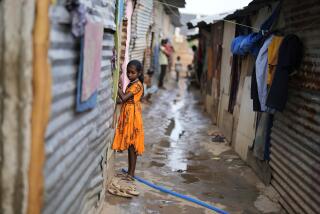In India, Tough Competition Makes Exams a Family Affair : Children: For the poor, schools offer hope for social mobility--but often little education. And that has made cheating a national epidemic.
- Share via
NEW DELHI, India — The pigtailed girl perched behind the battered desk in the first row glanced furtively out the classroom window. Her hand flashed a signal. Seconds later, a tiny rock wrapped in white paper pinged through the window grate and bounced onto the floor next to her desk.
Within minutes, a hailstorm of white balls sailed through the open windows, and a dozen young girls scrambled to collect them. The barrage of cheat sheets marked the start of the school year’s final exams--Indian style.
While teachers looked on helplessly in the classrooms and police watched diffidently in the school yard below, dozens of brothers, fathers and cousins stood outside a government school in the village of Chawla one morning last spring, hurling rock-propelled answer sheets to students who had just been handed standardized math exams.
In India, cheating on school exams has become a national epidemic. India’s 850 million people, more than three times the population of the United States, are overwhelmingly poor and have only a few narrow avenues for reaching the relatively tiny middle class, whose comforts they watch nightly on television. Competition is brutal for jobs, desirable marriages, seats in college.
For many, cheating seems the only way. Police are routinely posted in most government schools during examination periods--and schools where cheating is not reported make newspaper headlines.
While schools offer hope for social mobility, they often fail to provide even the basics of education.
“Cheating is just a symptom of all that’s wrong with the school system,” said Kanwaldeep Singh, education reporter for the Indian Express, a New Delhi daily newspaper. “The students cheat because they haven’t been taught throughout the year. They are not cheating to be on the merit list--they are cheating just to pass the exam. . . . Without trying to justify it, cheating has become a necessity.”
Last year, 58% of all 10th graders who took the national standardized examination needed for promotion failed to make the passing score of 33%. In several New Delhi schools, not a single student passed the exams.
The many students who fail the standardized tests, administered in the fifth and 10th grades, usually drop out of school. India does little to encourage its most vulnerable students to stay: half of the country’s children between the ages of 6 and 14 do not go to school. Of those who begin first grade, only half reach the fifth. A quarter finish eighth grade, and a mere fraction graduate from high school.
There is a chronic shortage of teachers. When a teacher is absent, there is no substitute. Children usually are left to fend for themselves. In rural areas, many low-paid government teachers skip classes for days at a time.
Even in the capital, New Delhi, students in the 950 government schools frequently spend the first two or three months of the school year without books. Conditions are abysmal; 50 of New Delhi’s government schools are nothing more than clusters of open tents that expose students to the 115-degree heat of spring and the drenching monsoons of late summer. In schools with buildings, children attend classes in double shifts to accommodate burgeoning populations.
In Chawla, a village on the outskirts of New Delhi, most students are the children of field hands or of laborers who commute to the capital. High school graduation is viewed as the only chance at social mobility for the youngsters, whose caste would normally relegate them to the same menial jobs as their parents.
“It is a matter of our children’s futures,” said one man who stood outside the school, waiting to slip an answer sheet to his daughter. “If they pass, they will get jobs and a good marriage. We must give help to our children.”
The competition for education to get jobs--and therefore to survive--is elevated to an intensity unmatched in Western societies. In even the most mediocre colleges, only 2% of applicants are accepted. In the job force, competition is even more vicious. Last year, for example, 100,000 aspirants applied to take exams for 820 positions in the Indian government civil service.
Outside Chawla’s high school, one man copying answers said the answer sheets were gotten from teachers or test officials who usually could be bribed. Family members gathered outside the school expecting the answer sheets to be available as part of the collective effort to help the children.
Dozens of men wrapped their answer sheets around stones. As children inside the school shouted from inside the classrooms, the men, surrounding the building, listened for the voices of their relatives and then tried to aim their cheat sheets at the right windows.
While cheating is most rampant in the poorest government schools, the pressures on children from middle-class and well-to-do families is no less severe.
“Everybody is after you during your boards,” said Puneeta Sahni, a 16-year-old whose parents hired a tutor to help her prepare for her 10th-grade exams. “Your parents sit on your head. They are continuously reminding me, ‘This is the most important exam in your life.’ ”
This year the government is considering a law that would make cheating a jailable offense. The proposal led one education specialist writing in the Pioneer newspaper to chastise officials “who view cheating as a law-and-order problem rather than an educational failure.”
More to Read
Sign up for Essential California
The most important California stories and recommendations in your inbox every morning.
You may occasionally receive promotional content from the Los Angeles Times.













